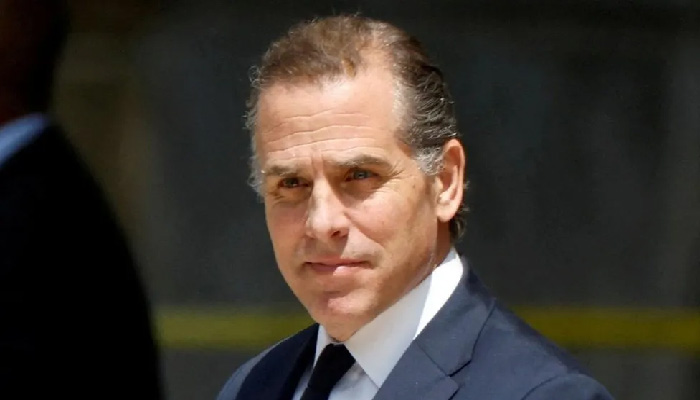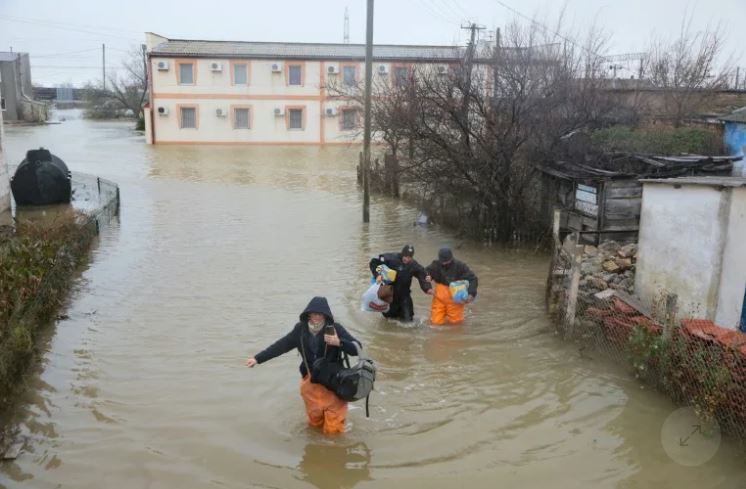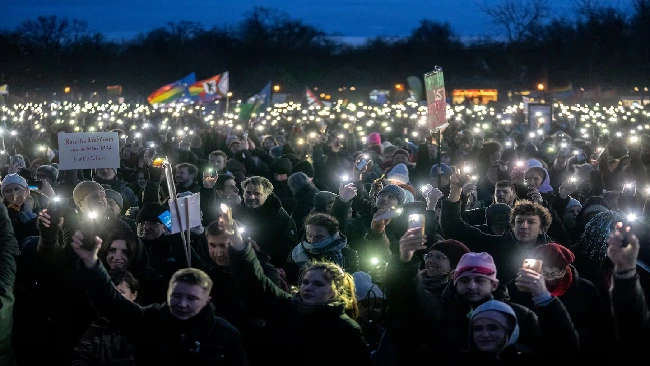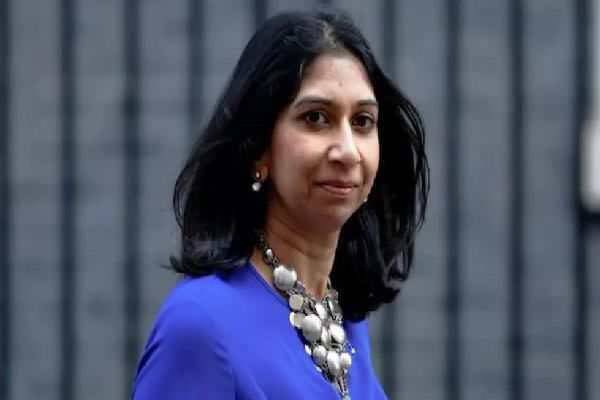September, 15, 2024 International Day of Democracy (United Nations)
By KnowledgeVeto Wednesday, September 11, 2024 18:10
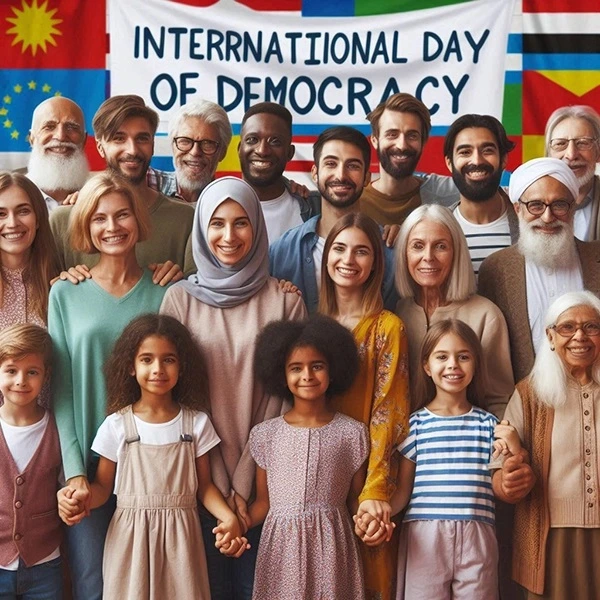
© Images Provided By Google, Bing AI
When & What?
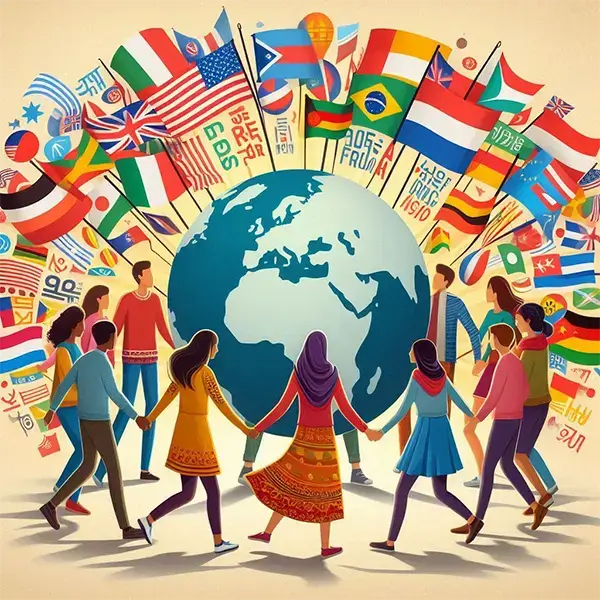
In 2007, the United Nations General Assembly declared September 15 as International Day of Democracy, with the goal of promoting and upholding democratic principles, and invited all member states and organizations to commemorate the day in a way that contributes to public awareness.
Democracies share basic characteristics, but there is no single model that applies to all countries or regions...Democracy is a global value founded on people's freely expressed desire to shape their own political, economic, social, and cultural systems, as well as their full participation in all parts of life.
Background
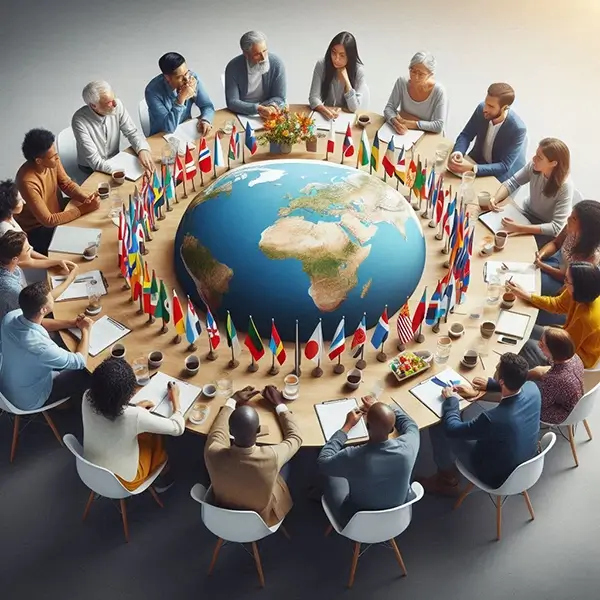
In September 1997, the Inter-Parliamentary Union (IPU) endorsed the Universal Declaration of Democracy. That Declaration embraces democratic values, democratic features and practices, and democracy's universal breadth.
The international conferences on new and restored democracies (ICNRD process) began in 1988 on the initiative of Philippine President Corazon C. Aquino, following the so-called peaceful "People Power Revolution" that deposed Ferdinand Marcos' 20-year tyranny. Initially an inter-governmental forum, the ICNRD process evolved into a tripartite organization involving governments, parliaments, and civil society.
The sixth conference (ICNRD-6) held in Doha, Qatar, in 2006 reinforced the process's tripartite structure and culminated with a declaration and Plan of Action that reaffirmed democracy's essential principles and ideals.
Following the outcome of ICNRD-6, an advisory board chaired by Qatar decided to support an International Day of Democracy. Qatar took the initiative in crafting a United Nations General Assembly resolution and had consultations with UN member states. The IPU proposed that the International Day of Democracy be observed annually on September 15 (the anniversary of the Universal Declaration of Democracy). The resolution, titled "Support by the United Nations system of Governments' efforts to promote and consolidate new or restored democracies," was passed by consensus on November 8, 2007.
Agenda and Adoption
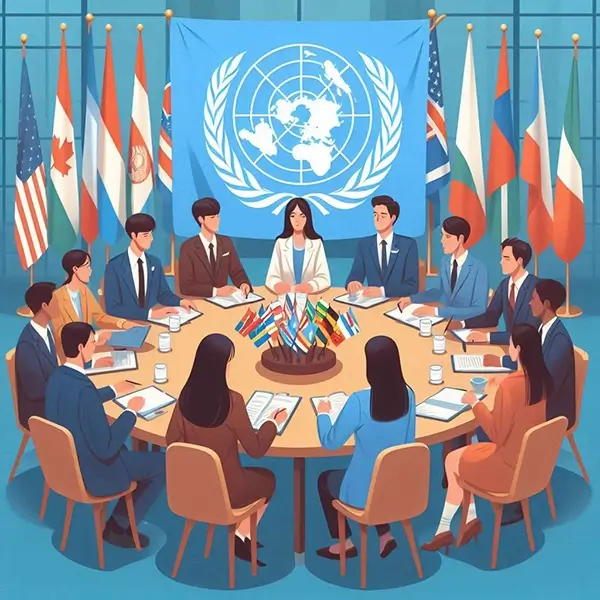
Referring to the Agenda for Democratization presented on December 20, 1996 by the UN Secretary-General to the 51st session of the United Nations General Assembly,
Adopts the following Universal Declaration on Democracy and encourages governments and parliaments around the world to follow its principles:
FIRST PART - THE PRINCIPLES OF DEMOCRACY
1. Democracy is a generally recognized ideal and aim based on shared ideals among peoples around the world, regardless of cultural, political, social, or economic disparities. It is thus a fundamental right of citizenship that must be exercised under conditions of freedom, equality, transparency, and accountability, while respecting the multiplicity of viewpoints and acting in the best interests of the polity.
2. Democracy is both an ideal to strive for and a mode of government to be implemented in ways that reflect the diversity of experiences and cultural differences while adhering to internationally recognized principles, norms, and standards. It is thus a constantly perfected and always perfectible state or condition, the evolution of which will be determined by a number of political, social, economic, and cultural variables.
3. As an ideal, democracy seeks to preserve and promote the individual's dignity and fundamental rights, to achieve social justice, to foster the community's economic and social development, to strengthen societal cohesion and enhance national tranquillity, and to create an environment conducive to international peace. As a form of government, democracy is the most effective way to achieve these goals; it is also the only political system capable of self-correcting.
4. The realization of democracy requires a genuine collaboration between men and women in the administration of societal activities, in which they work in equality and complementarity, enriching each other via their differences.
5. A democratic state assures that the mechanisms by which power is acceded to, wielded, and alternated allow for free political competition and are the result of open, free, and non-discriminatory participation by the people, exerted in line with the rule of law, both in text and spirit.
6. Democracy is inextricably linked to the rights guaranteed by the international instruments mentioned in the preamble. These rights must thus be applied properly, and their full implementation must be accompanied by individual and collective obligations.
7. Democracy is based on the rule of law and the exercise of human rights. In a democratic state, no one is above the law, and everyone is treated equally before the law.
8. Democracy requires and produces peace, economic, social, and cultural growth. Peace, progress, the rule of law, and human rights are all interdependent.
SECOND PART - THE ELEMENTS AND EXERCISE OF DEMOCRATIC GOVERNMENT
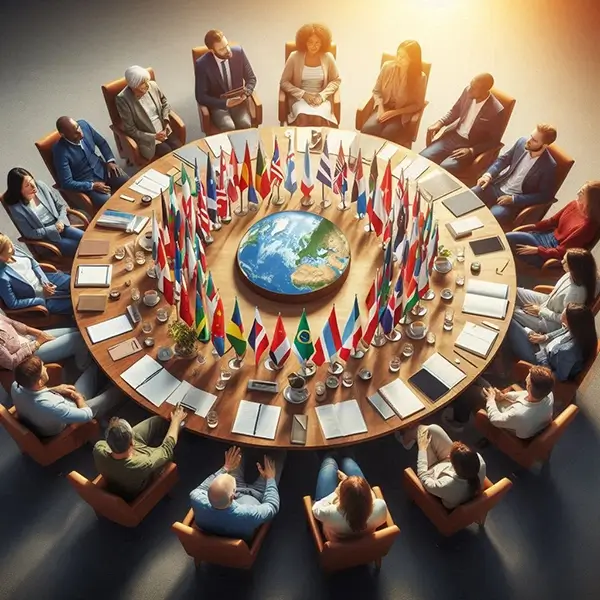
9. Democracy is founded on the existence of well-structured and well-functioning institutions, as well as a set of standards and regulations, and on society's collective will, which is fully aware of its rights and obligations.
10. Democratic institutions must mediate conflicts and preserve equilibrium between opposing claims of diversity and uniformity, individuality and collectivity, in order to strengthen social cohesion and solidarity.
11. Democracy is based on everyone's right to participate in the management of public affairs; as a result, it necessitates the existence of representative institutions at all levels, particularly a Parliament that represents all segments of society and has the necessary powers and means to express the will of the people by legislating and overseeing government action.
12. The conduct of free and fair elections at regular intervals to reflect the will of the people is a critical component of democratic practice. These elections must be held via universal, equal, and secret suffrage, allowing all voters to choose their representatives in an environment of equality, openness, and transparency that promotes political competition. To that purpose, civil and political rights are crucial, particularly the right to vote and be elected, the right to free expression and assembly, access to information, and the right to create political parties and engage in political activities. To maintain the integrity of democratic processes, party organisation, activities, finances, funding, and ethics must be effectively and impartially regulated.
13. It is the State's primary responsibility to ensure that its citizens enjoy their civil, cultural, economic, political, and social rights. Democracy consequently requires an effective, honest, and transparent administration that is freely elected and accountable for managing public affairs.
14. Public accountability, which is important to democracy, applies to all people in positions of public authority, whether elected or unelected, as well as all bodies of public authority without exception. Accountability comprises the public's right to obtain information about government operations, as well as the right to petition and seek remedy through impartial administrative and judicial channels.
15. A sense of ethics and openness must pervade all aspects of public life, and proper norms and processes must be established to ensure their upholding.
16. Individual involvement in democratic processes and public life at all levels shall be governed fairly and impartially, with no discrimination or risk of intimidation from state or non-state actors.
17. Judicial institutions and independent, impartial, and effective oversight procedures ensure the rule of law, which is the foundation of democracy. In order for these institutions and mechanisms to fully ensure rule compliance, improve process fairness, and redress injustices, all must have equal access to administrative and judicial remedies, as well as respect for administrative and judicial decisions by State organs and representatives of public authority, as well as by each member of society.
18. While an active civil society is an important component of democracy, individuals' ability and willingness to participate in democratic processes and make governance decisions cannot be taken for granted. As a result, it is vital to create conditions that encourage the real exercise of participatory rights, as well as to remove barriers that impede, hinder, or obstruct such exercise. It is thus critical to ensure the long-term improvement of, among other things, equality, transparency, and education, as well as the removal of barriers such as ignorance, intolerance, apathy, a lack of genuine choices and alternatives, and the absence of measures to address social, cultural, religious, and racial imbalances or discrimination, or for reasons of gender.
19. To maintain a state of democracy, a democratic environment and culture must be constantly nourished and reinforced through education and other cultural and information vehicles. As a result, a democratic society must be committed to education in the fullest sense, particularly civic education and the development of responsible citizens.
20. A positive economic environment promotes democratic processes; consequently, in its overall development effort, society must commit to meeting the basic economic requirements of the most disadvantaged, enabling their full participation in the democratic process.
21. The status of democracy assumes freedom of thought and expression; this right entails the freedom to hold opinions without interference, as well as the freedom to seek, receive, and transmit information and ideas through any medium and across borders.
22. In order to protect diversity, pluralism, and the right to be different in an atmosphere of tolerance, democratic structures and procedures must allow for the participation of all people in both homogenous and varied societies.
23. Democratic institutions and processes must also promote decentralised local and regional government and administration, which is both a right and a requirement, and allows for more public engagement.
THIRD PART - THE INTERNATIONAL DIMENSION OF DEMOCRACY
24. Democracy must be recognized as an international principle that applies to international organizations and states in their international interactions. The notion of international democracy encompasses not only equal or fair representation of states, but also the economic rights and duties of states.
25. Democratic ideals must be applied to the worldwide management of global concerns and humanity's common legacy, particularly the human environment.
26. To preserve international democracy, states must ensure that their actions are consistent with international law, refrain from using or threatening force, and refrain from any conduct that endangers or violates other states' sovereignty, political or territorial integrity, and take steps to resolve their differences peacefully.
27. Democracy should uphold democratic values in foreign interactions. In this regard, democracies must refrain from undemocratic behavior, express solidarity with democratic governments and non-state actors such as non-governmental organizations that work for democracy and human rights, and show solidarity with those who have suffered human rights violations at the hands of undemocratic regimes. To strengthen international criminal justice, democracies must oppose impunity for international crimes and egregious abuses of fundamental human rights, as well as support the establishment of a permanent international criminal court.
Ensuring effective governance of AI at all levels
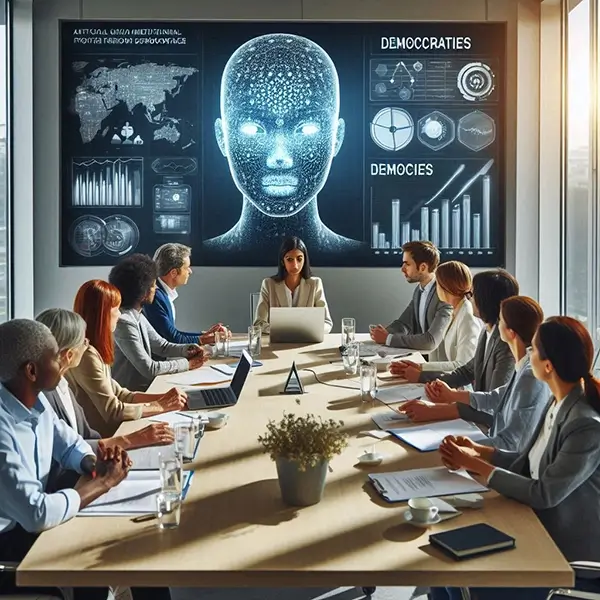
The subject for this year's International Day of Democracy is the role of artificial intelligence as a tool for democratic governance.
In his message for the commemoration, Secretary-General António Guterres observes that AI has the potential to improve public engagement, equality, security, and human development, but warns that if "left unchecked," its hazards "could have serious implications for democracy, peace, and stability."
Effective AI governance at all levels, including internationally, is critical, according to the Secretary-General, who notes that the High-Level Advisory Body on Artificial Intelligence recently produced a report "with recommendations on harnessing AI benefits while mitigating risks".
Recommendations: AI tools should be available to everyone.
The paper identifies the following principles to lead the creation of new global AI governance institutions:
Inclusivity: All citizens, including those from the Global South, should be able to access and use AI tools.
Public interest: Governance should go beyond the do-no-harm concept to establish a broader accountability framework for AI developers, deployers, and controllers, as well as downstream users.
The centrality of data governance: AI governance is inextricably linked to data governance and data commons development.
Universal, networked, and multistakeholder: AI governance should prioritize universal buy-in from countries and stakeholders. It should take advantage of existing institutions via a networked approach. International Law: AI governance should be based on the UN Charter, International Human Rights Law, and the Sustainable Development Goals.
Analyzing the impact of AI in democracies
Similarly, UNESCO's Recommendation on the Ethics of Artificial Intelligence is the first worldwide policy framework for AI, with an emphasis on its impact on politics and democracy. The paper explores the current and potential influence of AI on democracy, as well as the advantages of digitalization for collective decision-making.
It is organized around four key themes: democratic expectations and disappointments of digitization, the new digital public sphere, the democracy of data, and democracy as a form of political decision-making. It offers recommendations for the democratic governance of artificial intelligence to mitigate negative impacts and promote a more democratic approach.
Democracy and Human Rights
The human rights normative framework
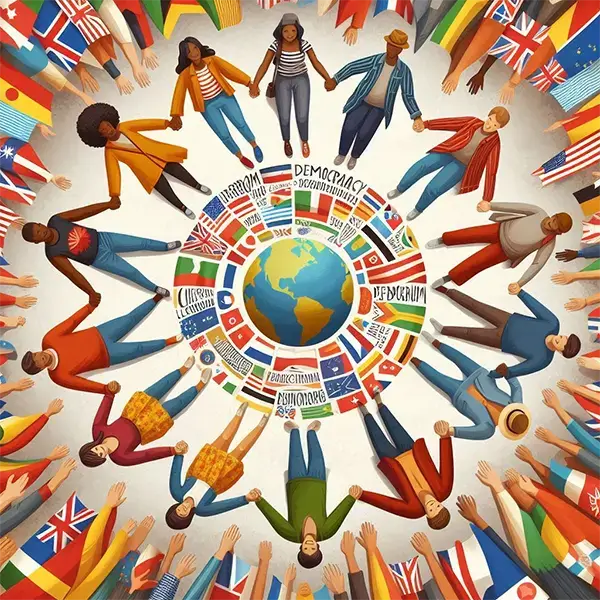
The principles of liberty, respect for human rights, and the principle of holding regular and genuine elections by universal suffrage are all necessary components of democracy. In turn, democracy fosters the preservation and effective implementation of human rights.
For numerous years, the United Nations General Assembly and the former Commission on Human Rights worked to develop a shared understanding of democratic principles and values through the use of international human rights instruments. As a result, in 2000, the Commission proposed a number of legislative, institutional, and practical steps to strengthen democracy. Furthermore, in 2002, the Commission defined the following elements as vital to democracy:
Respecting human rights and fundamental liberties.
Freedom of Association.
Free expression and opinion.
Access to power and its exercise under the rule of law.
Periodic free and fair elections via universal suffrage and secret vote as a representation of the people's will.
A diverse system of political parties and groups.
The separation of powers.
Independence of the judiciary.
transparency and accountability in public administration.
Free, independent, and pluralistic media.


